JACOB'S DEATH
"And the days drew near that Israel must die" {Gen. 47:29}.
Rabbi Hiyya said: Here, in the mention of his death, the name Israel is written, while above, in speaking of his life, he is called Jacob, as it is written, "And Jacob lived..." {Gen. 47:28}. Why is this? Rabbi Yose replied: Remark now the word "days". Is it not strange, for a man dies only on one day, or rather, in one instant.
The reason, however, is this: When God has decided to receive back a man's spirit, he passes in review all the days of the man's life in this world. And happy the man whose days draw near to pass before the King without blame, with not a single one rejected on account of any sin therein. Thus, "draw near" is said of the righteous, inasmuch as their days draw near to pass before the King without blame. And woe unto the wicked, whose days were all spent in sin and go unrecorded above, and hence their days cannot draw near. Of them it says: "The way of the wicked is as darkness; they know not at what they stumble" {Prov. 4.19}.
Therefore it is written that the days of Israel "drew near", without blame and with unblemished joy; therefore is the name Israel used, to signify a greater perfection than the name Jacob.
Said Rabbi Yose: There are certain righteous ones whose days, when they are reckoned up, are placed aways from the King, and others are there whose days are brought near to the King, and their portion is blessed, and among these was Israel.
"And he called his son Joseph" {Gen. 47:29}. Were, then, the other ones not his sons?
Rabbi Abba explained: We see that Joseph is spoken of as Jacob's son in a more poignant way than his brethren. For, we remember that when he was tempted by Potiphar's wife, he looked up and beheld his father's image (as it is written, "and there was none of the men of the house there within" {Gen. 39:11}, which we take to mean, "but there was someone else"), and when Joseph saw his father, he resisted and left. And so Jacob, when blessing all his sons, said to Joseph: "I know it, my son, I know it" {Gen. 48:19}, and in the repetition of the word is meant: I know the occasion when in your very body you proved you were my son.
Also, it is explained that Joseph so nearly resembled his father that whoever saw him recognized he was the son of Jacob. Therefore did Jacob say to him, "my son". To this Rabbi Yose added another reason, namely, that Joseph was the mainstay of Jacob and his family in Jacob's old age.
Moreover, Jacob requested Joseph and not any other son to bury him, for Joseph alone could take him out of Egypt.
Rabbi Yose then asked: Jacob knew that his descendants would be slaves in Egypt; why then did he not show the true concern of a parent and cause himself to be buried there, so that his merit might shield them? However, we know through tradition that Jacob, when he was ready to go into Egypt, was beset with the fear that his posterity might be lost among the nations and that God might withdraw his Presence from him. And therefore God said to him: "Fear not to go down into Egypt, for I will there make of thee a great nation" {Gen. 46:3}, and further, "I will go down with thee into Egypt" {Gen. 46:4}. Still Jacob feared that he might be buried in Egypt and not with his ancestors, whereupon God said: "I will also surely bring thee up again" {ibid.}, which is to say, so that you may be buried with your fathers.
Thus, for several reasons Jacob wished to be returned from Egypt. For one, because he had knowledge that God would punish the gods of the Egyptians, and he feared lest the Egyptians should make a god of him. Also, he was certain that God would not withdraw his Presence from among his descendants in exile. Third, he desired that his body be laid to rest together with his ancestors, so as to be among them and not with the sinners of Egypt, for Jacob, as we know, repeated the beauty of Adam, and was of a form sublime and holy, like to the holy throne. The secret of the matter is, however, that there is no separation among the patriarchs, and therefore he said: "when I sleep with my fathers" {Gen. 47:30}.
Still another reason that Jacob addressed Joseph as "my son": it was to Rachel that Jacob had given his whole devotion, and from the very beginning he had been more eager to beget Joseph than any other of the sons.
Rabbi Simeon said: All man's acts are written down in a book, and scrutinized by the Holy King and Stand revealed before him; therefore let man take grave concern neither to sin nor in any way to go against the will of his Master, for even man's thoughts are known to God and do not elude him.
The night when Jacob went in to Leah and she offered him the tokens he had provided Rachel with, he was led to believe she was Rachel, and God from whom no secret is hidden permitted Jacob's thought to hold, and thus the birthright of Reuben was given over to Joseph, it having been Jacob's first seed, and so Rachel came into her own inheritance. Therefore it is that Leah named him Reuben {see a son} and not Reubeni {see my son}.
We have been taught: God was aware that Jacob had not the intention to transgress before him, nor did he allow his mind to turn to any other woman at that moment as do the sinful, and therefore it is written: "Now the sons of Jacob were twelve" {Gen. 35:22}. There is another name known to the Companions for the son begotten by a sinner who acts thus. Therefore it is said, Jacob "called his son Joseph"—his very son, his son in the first and at the last.
"Put, I pray thee, thy hand under my thigh" {Gen. 47:29}.
Rabbi Yose said: Jacob insisted he swear by the mark of the covenant which had been put into his flesh, for this was held by the patriarchs to be paramount, and this covenant is also symbolized by Joseph.
Rabbi Simeon said: We find the same, "put thy hand under my thigh", with reference to Abraham and to Jacob both, but not in connection with Isaac, for the reason that Esau came out of Isaac.
Further, it may be imagined that Jacob meant: Swear to me by the holy mark which has yielded into the world holy and faithful seed, remaining always undefiled, that you will not bury me among the unclean ones who have taken no heed to it.—If so, why, one may ask, was Joseph, who kept the covenant, buried among them? On this account: for the sake of a particular situation, as when God appeared to Ezekiel outside the Holy Land, by the river Chebar. For God saw that were Joseph to be taken away, the Israelites would be stamped down in bondage, and so he said: Make his burial in the water,* a place which is not susceptible of {levitical} uncleanness, and then the Israelites will be enabled to endure the captivity.
Rabbi Yose said: Jacob perceived that, like his fathers, he was in all ways suited to become part of the holy chariot {on which the Divinity rests}, but he deemed it impossible for his body to be conjoined to his fathers if he were buried in Egypt.
The patriarchs, as is known, were permitted to have their wives buried with them in the cave of Machpelah, and why then was Jacob buried with Leah, and not with Rachel, who was the "foundation of the house"? On this account, that Leah bore more children from the holy seed.
Rabbi Judah said: When Leah heard that Jacob was righteous, she used to go out each day to the highway and weep for him and pray for him. Rachel never did this. Wherefore it was granted Leah to be buried with him, but Rachel's grave was set by the highway.
In secret doctrine, as we have established, the reason is that the one symbolizes the revealed, the other the hidden sphere of being. We know from tradition that the virtuous Leah shed much tears praying that she be given to Jacob and not to the wicked Esau. And thus we perceive that whoever has a punishment marked out for him can effect that it be cancelled by praying with tears before the Almighty; so Leah, assigned to Esau by divine decree, yet managed by prayer to satisfy her preference for Jacob and kept herself from being given to Esau.
Rabbi Isaac said: It stands written, "And Solomon's wisdom excelled the wisdom of all the children of the east" {Kings 5:10}. What is meant by the wisdom of the children of the East? We know from tradition that this was the wisdom inherited by them from Abraham. For we read that Abraham "gave all that he had unto Isaac" {Gen. 25:5}; by this is meant the higher wisdom, which was Abraham's because he possessed knowledge of the holy name of God. "But to the sons of the concubines, that Abraham had, Abraham gave gifts" {Gen. 25:6}, that is, knowledge of a kind about the lower crowns {the demonic forces}, and he established them in the "east country {ibid.}, and it was from this source that the children of the East received their magic wisdom...
"But when I sleep with my fathers" {Gen. 47:30}.
Happy is the portion of the patriarchs: they are made a holy chariot of God, who has found delight in them and been crowned with them; therefore it is written, "Only the Lord had a delight in thy fathers" {Deut. 10:15}.
Rabbi Eleazar said: Jacob had knowledge that he would be crowned in his fathers and his father with him...
Rabbi Judah said: Men's ears are shut to the admonitions of the Torah, and their eyes to their own state, in not realizing that in the day on which a human being appears in the world there appear all the days assigned to him, and these swarm about the world and then each in turn descends to the man to warn him. And if the man, being so warned, yet transgresses against his Master, then that day in which he transgressed ascends in shame and stands isolated outside, bearing witness, and remains thus until the man repents. If the man turns to righteousness, the day goes back to its position, but if not, then it goes to join the outer spirit and returns to its dwelling and then takes on the very same shape as the man, so as to plague him, and it stays with him in his house. If the man prove righteous, it proves a good companion; if not, it is an evil companion. Either way, this kind of day is missing from the full number and not reckoned in with the others.
Woe to the man that has lessened his days before the Almighty, nor left himself days wherewith to crown himself in the other world and to draw near to the Holy King. For being worthy, he ascends by virtue of those days, and those days in which he did righteously and sinned not become for his soul a garment of splendour. Woe to him that has lessened his days above, for the days damaged by his sins are lacking when it comes time to be garbed in his days, and his garment is therefore imperfect; worse is it if there are many such, and then he has nothing at all for garb in the other world. Alas for him and for his soul: he is punished in Gehinnom many days for each of those days, seeing that when he left this world he was without any days to be garbed in, he had no garment to put over him.
The righteous are happy ones, for their days are in store with the Holy King, and make a splendid attire for clothing themselves, in the other world. This is the secret meaning of the verse, "and they knew that they were naked" {Gen. 3:7}, which is to say, the glorious vestments composed of those days had been ruined and no day was left to be clothed in. It remained so until Adam repented. Then God pardoned him and made other clothes for him, but these were not made from his days, as it stands: "And the Lord God made for Adam and for his wife garments of skins, and clothed them." {Gen. 3:21}.
We see that concerning Abraham it says "he came into days" {Gen 24:1}, for on leaving this world he did indeed gain possession of his previous days as an investiture, and his garment of splendor was abundant and perfect. But Job said of himself: "Naked came I out of my mother's womb, and naked shall I return thither" {Job 1:21}, inasmuch as there was no garment left with which to clothe himself.
Our teachers have taught: The righteous are glad, forasmuch as their days are without blemish and stay for the world to come, and so, after death, the days are put together to make a garment of splendor in which they have the honor to taste of the delights of the future world, and in which they are destined to receive life again. But woe to the sinners whose days are damaged and in consequence nothing is left with which to clothe themselves when they depart from the world.
Moreover, we have learned that all they who by righteousness have gained for themselves a garment of glory made of their days are in the future world crowned like the patriarchs, with crowns from the stream that flows unceasing into the Garden of Eden, and it is written of these: "The Lord will guide thee continually, and satisfy thy soul in resplendent places" {Isa. 58:11}, but the sinners who have failed to get themselves such a garment will be "like a tamarisk in the desert, and shall not see when good cometh; but shall inhabit the parched places in the wilderness" {Jer. 17:6}.
Rabbi Isaac then said: Jacob, of all men, had the happiest chance, for the garment was his due by virtue both of his days and those of his ancestors; therefore he said: "when I sleep with my fathers."
Rabbi Judah said: When Jacob went in to obtain the blessing from his father, he was clothed in the clothes of Esau, yet it is written that Isaac smelled his raiment {Gen. 27:27}, that is, there came to his nostrils the odor of Jacob's raiment in the future world, and it was on this account he blessed him. And so he said: "See, the smell of my son is as the smell of a field of holy apple trees wherein dew from the realm called heaven drops each day;" and he continued: "So God give thee of the dew of heaven" {Gen. 27:28}. We have been taught that every day from the Garden of Eden there rise fifteen odors with which are perfumed the precious raiment in the other world.
Rabbi Judah inquired as to how many garments there are. Rabbi Eleazar replied: On this point, the masters differ, but actually, there are three. One is to clothe the spirit {ruah} in the earthly Garden of Eden. Most precious is the second, which is for the clothing of the innermost soul {neshamah} when it is among the "bundle of life" {I Sam. 25:29} in the circle of the King. The third is an outer cloak, appearing and disappearing, with which the vital soul {nefesh} is clothed. This one moves around from place to place in this world and on the Sabbaths and the New Moons it seeks out the spirit in the earthly paradise, from which it learns certain things and the knowledge of these it spreads in this world. It is taught that on Sabbaths and New Moons the soul {nefesh} pays two visits. First, it seeks out the spirit, among the perfumes of the earthly paradise, and then together with the spirit, among the perfumes of the earthly paradise, and then together with the spirit it seeks out the higher soul in the "bundle of life", and regales itself on the splendid radiance emanating from both sides. This is implied in the words, "The Lord will... satisfy thy soul in resplendent places" {Isa. 58:11}, where the plural is meant to include the two, the outer refulgence of the place of the spirit, and the radiance within radiance which comes to them by being with the higher soul in the "bundle of life".
________________
* According to tradition, Joseph's coffin was placed in the river, where it remained until the Exodus.
Rabbi Hiyya said: Here, in the mention of his death, the name Israel is written, while above, in speaking of his life, he is called Jacob, as it is written, "And Jacob lived..." {Gen. 47:28}. Why is this? Rabbi Yose replied: Remark now the word "days". Is it not strange, for a man dies only on one day, or rather, in one instant.
The reason, however, is this: When God has decided to receive back a man's spirit, he passes in review all the days of the man's life in this world. And happy the man whose days draw near to pass before the King without blame, with not a single one rejected on account of any sin therein. Thus, "draw near" is said of the righteous, inasmuch as their days draw near to pass before the King without blame. And woe unto the wicked, whose days were all spent in sin and go unrecorded above, and hence their days cannot draw near. Of them it says: "The way of the wicked is as darkness; they know not at what they stumble" {Prov. 4.19}.
Therefore it is written that the days of Israel "drew near", without blame and with unblemished joy; therefore is the name Israel used, to signify a greater perfection than the name Jacob.
Said Rabbi Yose: There are certain righteous ones whose days, when they are reckoned up, are placed aways from the King, and others are there whose days are brought near to the King, and their portion is blessed, and among these was Israel.
"And he called his son Joseph" {Gen. 47:29}. Were, then, the other ones not his sons?
Rabbi Abba explained: We see that Joseph is spoken of as Jacob's son in a more poignant way than his brethren. For, we remember that when he was tempted by Potiphar's wife, he looked up and beheld his father's image (as it is written, "and there was none of the men of the house there within" {Gen. 39:11}, which we take to mean, "but there was someone else"), and when Joseph saw his father, he resisted and left. And so Jacob, when blessing all his sons, said to Joseph: "I know it, my son, I know it" {Gen. 48:19}, and in the repetition of the word is meant: I know the occasion when in your very body you proved you were my son.
Also, it is explained that Joseph so nearly resembled his father that whoever saw him recognized he was the son of Jacob. Therefore did Jacob say to him, "my son". To this Rabbi Yose added another reason, namely, that Joseph was the mainstay of Jacob and his family in Jacob's old age.
Moreover, Jacob requested Joseph and not any other son to bury him, for Joseph alone could take him out of Egypt.
Rabbi Yose then asked: Jacob knew that his descendants would be slaves in Egypt; why then did he not show the true concern of a parent and cause himself to be buried there, so that his merit might shield them? However, we know through tradition that Jacob, when he was ready to go into Egypt, was beset with the fear that his posterity might be lost among the nations and that God might withdraw his Presence from him. And therefore God said to him: "Fear not to go down into Egypt, for I will there make of thee a great nation" {Gen. 46:3}, and further, "I will go down with thee into Egypt" {Gen. 46:4}. Still Jacob feared that he might be buried in Egypt and not with his ancestors, whereupon God said: "I will also surely bring thee up again" {ibid.}, which is to say, so that you may be buried with your fathers.
Thus, for several reasons Jacob wished to be returned from Egypt. For one, because he had knowledge that God would punish the gods of the Egyptians, and he feared lest the Egyptians should make a god of him. Also, he was certain that God would not withdraw his Presence from among his descendants in exile. Third, he desired that his body be laid to rest together with his ancestors, so as to be among them and not with the sinners of Egypt, for Jacob, as we know, repeated the beauty of Adam, and was of a form sublime and holy, like to the holy throne. The secret of the matter is, however, that there is no separation among the patriarchs, and therefore he said: "when I sleep with my fathers" {Gen. 47:30}.
Still another reason that Jacob addressed Joseph as "my son": it was to Rachel that Jacob had given his whole devotion, and from the very beginning he had been more eager to beget Joseph than any other of the sons.
Rabbi Simeon said: All man's acts are written down in a book, and scrutinized by the Holy King and Stand revealed before him; therefore let man take grave concern neither to sin nor in any way to go against the will of his Master, for even man's thoughts are known to God and do not elude him.
The night when Jacob went in to Leah and she offered him the tokens he had provided Rachel with, he was led to believe she was Rachel, and God from whom no secret is hidden permitted Jacob's thought to hold, and thus the birthright of Reuben was given over to Joseph, it having been Jacob's first seed, and so Rachel came into her own inheritance. Therefore it is that Leah named him Reuben {see a son} and not Reubeni {see my son}.
We have been taught: God was aware that Jacob had not the intention to transgress before him, nor did he allow his mind to turn to any other woman at that moment as do the sinful, and therefore it is written: "Now the sons of Jacob were twelve" {Gen. 35:22}. There is another name known to the Companions for the son begotten by a sinner who acts thus. Therefore it is said, Jacob "called his son Joseph"—his very son, his son in the first and at the last.
"Put, I pray thee, thy hand under my thigh" {Gen. 47:29}.
Rabbi Yose said: Jacob insisted he swear by the mark of the covenant which had been put into his flesh, for this was held by the patriarchs to be paramount, and this covenant is also symbolized by Joseph.
Rabbi Simeon said: We find the same, "put thy hand under my thigh", with reference to Abraham and to Jacob both, but not in connection with Isaac, for the reason that Esau came out of Isaac.
Further, it may be imagined that Jacob meant: Swear to me by the holy mark which has yielded into the world holy and faithful seed, remaining always undefiled, that you will not bury me among the unclean ones who have taken no heed to it.—If so, why, one may ask, was Joseph, who kept the covenant, buried among them? On this account: for the sake of a particular situation, as when God appeared to Ezekiel outside the Holy Land, by the river Chebar. For God saw that were Joseph to be taken away, the Israelites would be stamped down in bondage, and so he said: Make his burial in the water,* a place which is not susceptible of {levitical} uncleanness, and then the Israelites will be enabled to endure the captivity.
Rabbi Yose said: Jacob perceived that, like his fathers, he was in all ways suited to become part of the holy chariot {on which the Divinity rests}, but he deemed it impossible for his body to be conjoined to his fathers if he were buried in Egypt.
The patriarchs, as is known, were permitted to have their wives buried with them in the cave of Machpelah, and why then was Jacob buried with Leah, and not with Rachel, who was the "foundation of the house"? On this account, that Leah bore more children from the holy seed.
Rabbi Judah said: When Leah heard that Jacob was righteous, she used to go out each day to the highway and weep for him and pray for him. Rachel never did this. Wherefore it was granted Leah to be buried with him, but Rachel's grave was set by the highway.
In secret doctrine, as we have established, the reason is that the one symbolizes the revealed, the other the hidden sphere of being. We know from tradition that the virtuous Leah shed much tears praying that she be given to Jacob and not to the wicked Esau. And thus we perceive that whoever has a punishment marked out for him can effect that it be cancelled by praying with tears before the Almighty; so Leah, assigned to Esau by divine decree, yet managed by prayer to satisfy her preference for Jacob and kept herself from being given to Esau.
Rabbi Isaac said: It stands written, "And Solomon's wisdom excelled the wisdom of all the children of the east" {Kings 5:10}. What is meant by the wisdom of the children of the East? We know from tradition that this was the wisdom inherited by them from Abraham. For we read that Abraham "gave all that he had unto Isaac" {Gen. 25:5}; by this is meant the higher wisdom, which was Abraham's because he possessed knowledge of the holy name of God. "But to the sons of the concubines, that Abraham had, Abraham gave gifts" {Gen. 25:6}, that is, knowledge of a kind about the lower crowns {the demonic forces}, and he established them in the "east country {ibid.}, and it was from this source that the children of the East received their magic wisdom...
"But when I sleep with my fathers" {Gen. 47:30}.
Happy is the portion of the patriarchs: they are made a holy chariot of God, who has found delight in them and been crowned with them; therefore it is written, "Only the Lord had a delight in thy fathers" {Deut. 10:15}.
Rabbi Eleazar said: Jacob had knowledge that he would be crowned in his fathers and his father with him...
Rabbi Judah said: Men's ears are shut to the admonitions of the Torah, and their eyes to their own state, in not realizing that in the day on which a human being appears in the world there appear all the days assigned to him, and these swarm about the world and then each in turn descends to the man to warn him. And if the man, being so warned, yet transgresses against his Master, then that day in which he transgressed ascends in shame and stands isolated outside, bearing witness, and remains thus until the man repents. If the man turns to righteousness, the day goes back to its position, but if not, then it goes to join the outer spirit and returns to its dwelling and then takes on the very same shape as the man, so as to plague him, and it stays with him in his house. If the man prove righteous, it proves a good companion; if not, it is an evil companion. Either way, this kind of day is missing from the full number and not reckoned in with the others.
Woe to the man that has lessened his days before the Almighty, nor left himself days wherewith to crown himself in the other world and to draw near to the Holy King. For being worthy, he ascends by virtue of those days, and those days in which he did righteously and sinned not become for his soul a garment of splendour. Woe to him that has lessened his days above, for the days damaged by his sins are lacking when it comes time to be garbed in his days, and his garment is therefore imperfect; worse is it if there are many such, and then he has nothing at all for garb in the other world. Alas for him and for his soul: he is punished in Gehinnom many days for each of those days, seeing that when he left this world he was without any days to be garbed in, he had no garment to put over him.
The righteous are happy ones, for their days are in store with the Holy King, and make a splendid attire for clothing themselves, in the other world. This is the secret meaning of the verse, "and they knew that they were naked" {Gen. 3:7}, which is to say, the glorious vestments composed of those days had been ruined and no day was left to be clothed in. It remained so until Adam repented. Then God pardoned him and made other clothes for him, but these were not made from his days, as it stands: "And the Lord God made for Adam and for his wife garments of skins, and clothed them." {Gen. 3:21}.
We see that concerning Abraham it says "he came into days" {Gen 24:1}, for on leaving this world he did indeed gain possession of his previous days as an investiture, and his garment of splendor was abundant and perfect. But Job said of himself: "Naked came I out of my mother's womb, and naked shall I return thither" {Job 1:21}, inasmuch as there was no garment left with which to clothe himself.
Our teachers have taught: The righteous are glad, forasmuch as their days are without blemish and stay for the world to come, and so, after death, the days are put together to make a garment of splendor in which they have the honor to taste of the delights of the future world, and in which they are destined to receive life again. But woe to the sinners whose days are damaged and in consequence nothing is left with which to clothe themselves when they depart from the world.
Moreover, we have learned that all they who by righteousness have gained for themselves a garment of glory made of their days are in the future world crowned like the patriarchs, with crowns from the stream that flows unceasing into the Garden of Eden, and it is written of these: "The Lord will guide thee continually, and satisfy thy soul in resplendent places" {Isa. 58:11}, but the sinners who have failed to get themselves such a garment will be "like a tamarisk in the desert, and shall not see when good cometh; but shall inhabit the parched places in the wilderness" {Jer. 17:6}.
Rabbi Isaac then said: Jacob, of all men, had the happiest chance, for the garment was his due by virtue both of his days and those of his ancestors; therefore he said: "when I sleep with my fathers."
Rabbi Judah said: When Jacob went in to obtain the blessing from his father, he was clothed in the clothes of Esau, yet it is written that Isaac smelled his raiment {Gen. 27:27}, that is, there came to his nostrils the odor of Jacob's raiment in the future world, and it was on this account he blessed him. And so he said: "See, the smell of my son is as the smell of a field of holy apple trees wherein dew from the realm called heaven drops each day;" and he continued: "So God give thee of the dew of heaven" {Gen. 27:28}. We have been taught that every day from the Garden of Eden there rise fifteen odors with which are perfumed the precious raiment in the other world.
Rabbi Judah inquired as to how many garments there are. Rabbi Eleazar replied: On this point, the masters differ, but actually, there are three. One is to clothe the spirit {ruah} in the earthly Garden of Eden. Most precious is the second, which is for the clothing of the innermost soul {neshamah} when it is among the "bundle of life" {I Sam. 25:29} in the circle of the King. The third is an outer cloak, appearing and disappearing, with which the vital soul {nefesh} is clothed. This one moves around from place to place in this world and on the Sabbaths and the New Moons it seeks out the spirit in the earthly paradise, from which it learns certain things and the knowledge of these it spreads in this world. It is taught that on Sabbaths and New Moons the soul {nefesh} pays two visits. First, it seeks out the spirit, among the perfumes of the earthly paradise, and then together with the spirit, among the perfumes of the earthly paradise, and then together with the spirit it seeks out the higher soul in the "bundle of life", and regales itself on the splendid radiance emanating from both sides. This is implied in the words, "The Lord will... satisfy thy soul in resplendent places" {Isa. 58:11}, where the plural is meant to include the two, the outer refulgence of the place of the spirit, and the radiance within radiance which comes to them by being with the higher soul in the "bundle of life".
________________
* According to tradition, Joseph's coffin was placed in the river, where it remained until the Exodus.
[full original text follows... ☟ ]
Volume 1:221b
א
וְהָכָא וַיִּקְרְבוּ יְמֵי יִשְׂרָאֵל וַדַּאי, בְּלָא כִסּוּפָא, בִּשְׁלֵימוּתָא, בְּחֶדְוָותָא שְׁלִים. וּבְגִינֵי כָּךְ, יְמֵי יִשְׂרָאֵל, דְּהֲוָה שְׁלִים יַתִּיר יִשְׂרָאֵל מִיַּעֲקֹב. וְאִי תֵימָא, וְהָא כְּתִיב, (בראשית כ״ה:כ״ז) וְיַעֲקֹב אִישׁ תָּם, שְׁלִים. שְׁלִים הֲוָה, וְלָא שְׁלִים בְּדַרְגָּא עִלָּאָה כְּיִשְׂרָאֵל.
ב
תַּנְיָא, אָמַר רִבִּי יוֹסֵי, בְּשַׁעְתָּא דְיוֹמוֹי דְּבַר נָשׁ אִתְפַּקִּידָן קַמֵי מַלְכָּא, אִית זַכָּאָה דְּאִתְפַּקְּדָן יוֹמוֹי וּרְחִיקִין מִקַּמֵּי מַלְכָּא. וְאִית זַכָּאָה, דְּכַד מִתְפַּקְּדָן יוֹמוֹי, קְרִיבִין וּסְמִיכִין לְמַלְכָּא, וְלָא מִתְרַחֲקִין. בְּלָא כִסּוּפָא עָאלִין, וְקָרִיבִין לְמַלְכָּא. זַכָּאָה חוּלְקֵהוֹן. הֲדָא הוּא דִכְתִיב, וַיִּקְרְבוּ יְמֵי יִשְׂרָאֵל לָמוּת.
ג
וַיִּקְרָא לִבְנוֹ לְיוֹסֵף, אָמַר רִבִּי יִצְחָק, וְכִי שְׁאָר שִׁבְטִין לָאו בְּנוֹי אִינוּן. אֶלָּא אָמַר רִבִּי אַבָּא, יוֹסֵף בְּנוֹ הֲוָה יַתִּיר מִכֻּלְּהוּ. דְּתָנִינָן, בְּשַׁעְתָּא דְּאִנְתְּתֵיהּ דְּפוֹטִיפַר דְּחָקַת לֵיהּ לְיוֹסֵף, מַה כְּתִיב, (בראשית ל״ט:י״א) וַיָּבֹא הַבַּיְתָה לַעֲשׂוֹת מְלַאכְתּוֹ וְאֵין אִישׁ מֵאַנְשֵׁי הַבַּיִת. הַאי קְרָא הָכִי מִבָּעֵי לֵיהּ, וְאֵין אִישׁ בַּבַּיִת. מַהוּ מֵאַנְשֵׁי הַבַּיִת. אֶלָּא לְאַכְלָלָא דִּיוּקְנָא דְיַעֲקֹב, דְּהֲוָה תַּמָּן וְאִשְׁתַּכַּח תַּמָּן. וּבְגִינֵי כָּךְ מֵאַנְשֵׁי הַבַּיִת, אֲבָל אִישׁ אָחֳרָא הֲוָה תַּמָּן. כֵּיוָן דְּסָלִיק יוֹסֵף עֵינוֹי, וְחֲמָא דִיוּקְנָא דַאֲבוֹי, יְתִיב בְּקִיּוּמֵיהּ, וְתָב לַאֲחוֹרָא.
ד
תָּא חֲזֵי, מַה כְּתִיב, (בראשית ל״ט:ח׳) וַיְמָאֵן וַיֹּאמֶר אֶל אֵשֶׁת אֲדֹנָיו. אָמַר לֵיהּ קוּדְשָׁא בְּרִיךְ הוּא, אַתְּ אֲמַרְתְּ וַיְמָאֵן, וַיֹּאמֶר. חַיֶּיךָ, וַיְמָאֵן וַיֹּאמֶר אָחֳרָא, יֵיתֵי לְבָרְכָא לִבְנָךְ, וְיִתְבָּרְכוּן בֵּיהּ. הֲדָא הוּא דִכְתִיב, וַיְמָאֵן אָבִיו וַיֹּאמֶר יָדַעְתִּי בְּנִי יָדַעְתִּי.
ה
כֵּיוָן דְּאָמַר יָדַעְתִּי בְּנִי, אַמַּאי אָמַר, יָדַעְתִּי אָחֳרָא. אֶלָּא אָמַר, יָדַעְתִּי בְּנִי, בְּזִמְנָא דְּקָיְימַת בְּגוּפָךְ דְּאַתְּ בָּרִי, כַּד חָמִית דִּיוּקְנָא דִילִי, וְתָבַת בְּקִיּוּמָךְ. וּבְגִינֵי כָּךְ כְּתִיב, יָדַעְתִּי בְּנִי, יָדַעְתִּי. עַל מַה דְּאֲמַרְתְּ דְּדָא הוּא בּוּכְרָא, גַּם הוּא יִהְיֶה לְעָם וְגַם הוּא יִגְדָּל, וְהָכָא בְּגִין כָּךְ כְּתִיב, וַיִּקְרָא לִבְנוֹ לְיוֹסֵף, לִבְנוֹ לְיוֹסֵף מַמָּשׁ.
ו
דָּבָר אַחֵר, וַיִּקְרָא לִבְנוֹ לְיוֹסֵף, דְּבְדִיוּקְנָא חַד הֲווּ מִתְחַזְּיָין. דְּכָל מַאן דְּחָמֵי לְיוֹסֵף, הֲוָה אַסְהִיד דִּבְרֵיהּ דְּיַעֲקֹב הֲוָה. רִבִּי יוֹסֵי אָמַר, כֹּלָּא הָכִי הוּא. וְעוֹד דְּיוֹסֵף זָן לֵיהּ וְלִבְנוֹי בְּסִבוּתֵיהּ, וּבְגִינֵי כָּךְ בְּנוֹ מַמָּשׁ, יַתִּיר מִכֻּלְּהוּ. וַיִּקְרָא לִבְנוֹ לְיוֹסֵף, אַמַּאי לְיוֹסֵף וְלָא לְאָחֳרָא. מִשּׁוּם דִּרְשׁוּתָא הֲוָה בִּידֵיהּ לְסַלְקֵיהּ מִתַּמָּן.
ז
רִבִּי יוֹסֵי אָמַר, כֵּיוָן דְּיַעֲקֹב הֲוָה יָדַע דִּבְנוֹי יִשְׁתַּעְבְּדוּן בְּגָלוּתָא תַּמָּן בְּמִצְרַיִם, אַמַּאי לָא אִתְקַבַּר תַּמָּן בְּגִין דְּיָגִין זְכוּתֵיהּ עַל בְּנוֹי. אַמַּאי בָּעָא לְאִסְתַּלְּקָא מִתַּמָּן. וְהָא כְּתִיב, (תהילים ק״ג:י״ג) כְּרַחֵם אָב עַל בָּנִים, אָן הוּא רַחְמָנוּתָא.
ח
אֶלָּא הָכִי תָּאנָא, בְּשַׁעְתָּא דְּהֲוָה נָחִית יַעֲקֹב לְמִצְרַיִם, הֲוָה דָחִיל. הֲוָה אָמַר, דִּילְמָא חַס וְשָׁלוֹם יִשְׁתֵּצוּן בָּנַי בֵּינִי עַמְּמַיָא, וְדִילְמָא קוּדְשָׁא בְּרִיךְ הוּא יְסַלֵּק שְׁכִינְתֵּיהּ מִינִי כְּקַדְמִיתָא. מַה כְּתִיב, (בראשית ל״ה:ט׳) וַיֵּרָא אֱלהִים אֶל יַעֲקֹב וְגו'. (בראשית מ״ו:ג׳) (ויאמר אלהים לישראל) אַל תִּירָא מֵרְדָה מִצְרַיְמָה כִּי לְגוֹי גָדוֹל אֲשִׂימְךָ שָׁם. וּמַה דְּאֲמַרְתְּ דִּילְמָא אֲסַלֵּק שְׁכִינָתִּי מִבֵּינָךְ, אָנֹכִי אֵרֵד עִמְּךָ מִצְרָיְמָה.
ט
אָמַר עוֹד, דָּחִילְנָא דִּילְמָא אִתְקַבַּר תַּמָּן, וְלָא אֶזְכֶּה עִם אֲבָהָתַי. אָמַר לֵיהּ וְאָנֹכִי אֲעַלְךָ גַּם עָלה. אֲעַלְךָ, מִמִּצְרַיִם. גַּם עָלה, לְאִתְקַבְּרָאָה בְּקִבְרָא דַּאֲבָהָתָךְ.
י
בְּגִינֵי כָּךְ, בָּעָא לְסַלְקָא גַרְמֵיהּ מִמִצְרַיִם. חַד, דְּלָא יַעַבְדוּן מִנֵּיהּ דַּחֲלָא, דְּהָא חָמָא דְקוּדְשָׁא בְּרִיךְ הוּא זַמִּין לְאִתְפְּרָעָא מִדַּחֲלֵיהוֹן. וְחַד, דְּחָמָא דִשְׁכִינְתָּא יְשַׁוֵּי מְדוֹרֵיהּ בֵּין בְּנוֹי בְּגָלוּתָא. וְחַד, בְּגִין דִּיהֵא גּוּפֵיהּ דַּיָּיר בֵּין גּוּפַיְיהוּ דַּאֲבָהָתוֹי לְאִתְכְּלָלָא בֵּינַיְיהוּ, וְלָא יִתְמַנֵּי עִם חַיָּיבַיָא דְמִצְרָאֵי.
יא
וְתָנִינָן, גּוּפָא דְיַעֲקֹב, אִתְמְשִׁיךְ מִשּׁוּפְרוֹי דְּאָדָם הָרִאשׁוֹן, וְהֲוָה דִּיוּקְנִיהּ דְּיַעֲקֹב, דִּיוּקְנָא עִלָּאָה קַדִּישָׁא. דִּיוּקְנָא דְּכוּרְסְיָא קַדִּישָׁא, וְלָא בָּעָא לְאִתְקְבָרָא בֵּינִי חַיָּיבַיָא. וְרָזָא דְמִלָּה, דְּבַאֲבָהָן לֵית פִּירוּדָא כְּלַל. וְעַל דָּא כְּתִיב וְ שָׁכַבְתִּי עִם אֲבוֹתַי.
יב
וַיִּקְרָא לִבְנוֹ לְיוֹסֵף, בְּנוֹ, בְּחַד דִּיוּקְנָא דְאַנְפִּין, בְּגִין דְּבִרְעוּתָא דְרוּחָא וְלִבָּא, אוֹלִיד לֵיהּ יַתִּיר מִכֻּלְּהוּ. תָּא חֲזֵי, מַה כְּתִיב, (בראשית ל׳:ט״ו) הַמְעַט קַחְתֵּךְ אֶת אִישִׁי, דְּכָל רְעוּתָא דְיַעֲקֹב בְּרָחֵל הֲוָה, וּבְגִין כָּךְ
Labels: Aramaic, Book of Splendor, English translations, Gershom Scholem, Hebrew, Jacob's Death, Kabbalah, nefesh, soul, Torah, Zohar
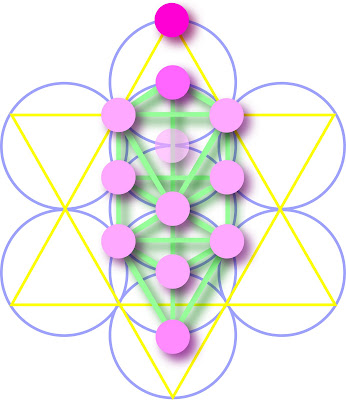

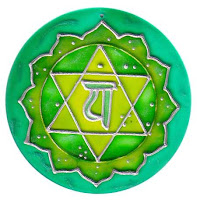

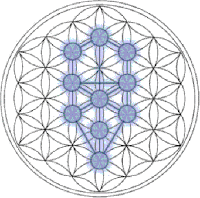

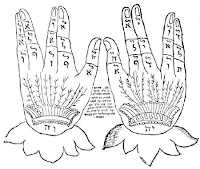

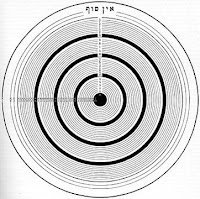
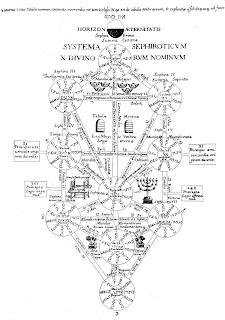
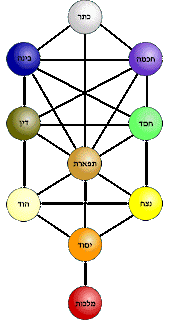
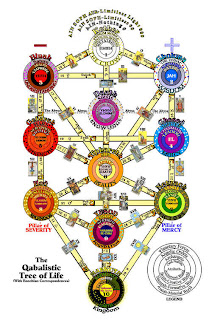

0 Comments:
Post a Comment
Subscribe to Post Comments [Atom]
<< Home